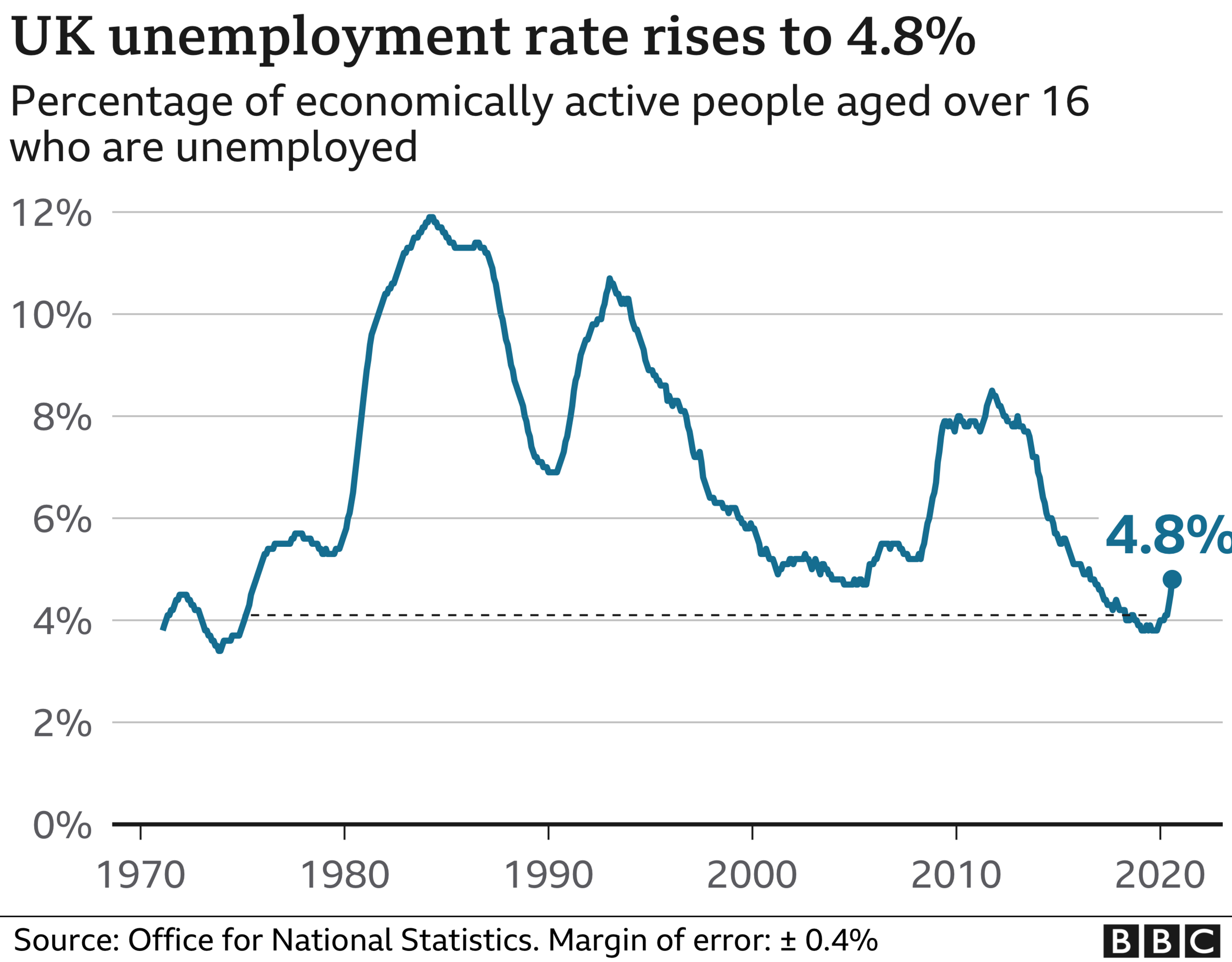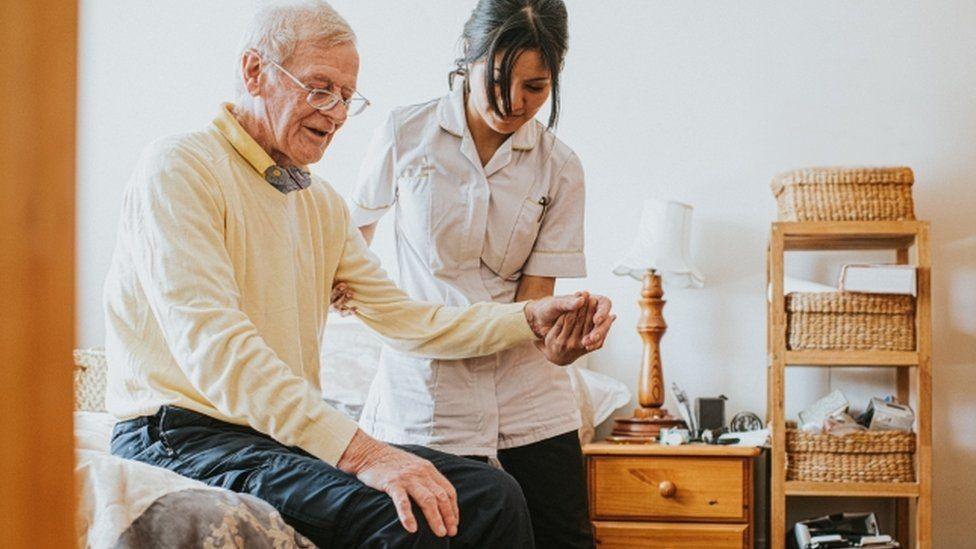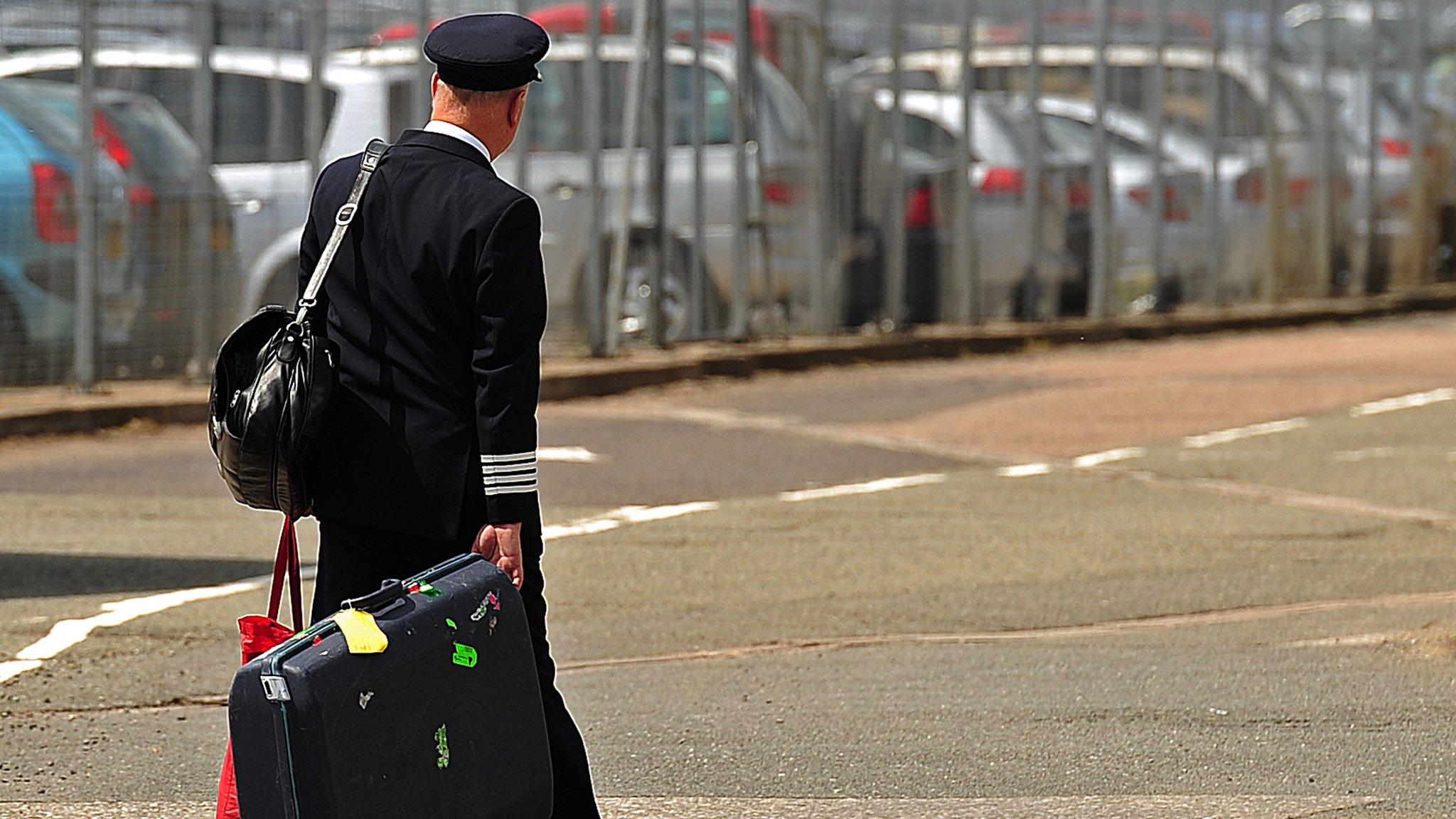Covid 19: I've lost my job, should I retrain?
- Published

Elle, pictured here alongside former Virgin chief executive Craig Kreeger, started working in the airline industry aged 18
The pandemic has already caused tens of thousands of people to lose their jobs, with unemployment surging. For those who have seen their industries decimated it has prompted a dilemma: stick it out, or try to find a new career.
Elle Haigh, 30, had her dream job as a flight attendant at Virgin Atlantic, where she spent almost nine years roaming the skies. But on a Monday morning last month, after a summer of job searching, she woke up ready to begin the first day of a whole new career.
"When everything started to change, I had to sit down and be realistic about what the future was," she says. "The chance of career progression [at Virgin] was really, really tough. To put it in perspective, they would have thousands of us applying for eight or nine jobs every year. The chance of progression was so slim it was like playing the lottery."
Elle decided to take voluntary redundancy to pursue a career in Stem [science, technology, engineering and maths] - "the stuff that I'd been interested in as a kid but never really believed that I could have a career in".
If it hadn't been for the pandemic, she says she "definitely" wouldn't have made the decision to leave at that point. Twelve years in the airline industry had left her somewhat oblivious to other professions, but her two sisters-in-law suggested project management would be a good match for her skills.

Elle has gone from flying around the world to working from her home in West Yorkshire
So she began researching new jobs, signed up to IT courses, spoke to the Open University's (OU) student support, and started applying for jobs.
Six months on - and after a "painful job hunt" consisting of 219 job applications, more than 200 rejections, five interviews (and four offers) - she found a job she now describes as a perfect fit.
Alongside the role, in which she will train to become a project manager, she has also started a part-time degree in Combined STEM with the OU.
"I had to make my peace with the fact that I'll be paying for my flights and I'll never get to see one of those beautiful business class seats again. But it's worth it to know that you've got a chance to go further."
The pandemic has brought tales of pilots becoming supermarket delivery drivers and cabin crew being put on standby to help out at the NHS Nightingale hospitals.
But while some people, like Elle, are ready for a change, others are reluctantly facing up to the idea of having to leave the aviation industry for good.
314,000People were made redundant between July and September this year
4.8%The UK's unemployment rate rose by 0.3% in the same three months
1.62 millionThe total number of people who are now out of work in the UK.
Charlotte, 30, who lives in Brixton, south London, was made redundant in August from her job as a pilot for a commercial airline in the UK. Being a pilot had been her lifelong ambition. She is downbeat about her prospects of finding another pilot role anytime soon, or possibly ever.
"It's just got to be put on hold and see what happens in say, four years, but then I might be well into another career by then," she says.
Right now, she sees her best case scenario as being able to find a job in another industry. What would that be? "I'm not really sure", she admits, although she says financial technology is seen as a good option for pilots.
So far more than 30 applications to a variety of jobs have yielded almost nothing - just a couple of rejections. "It's going well," she jokes.
After not hearing anything from her flying applications, which included jobs in the Middle East, Hong Kong and the RAF, she branched out to applying for positions ranging from working for the government to sportswear brand Lululemon.

Charlotte is currently serving her three-month notice period after being made redundant
Unemployment in the UK has surged in recent months, with jobs in aviation, hospitality, retail, arts and entertainment particularly badly hit.
Last month, Chancellor Rishi Sunak said that all workers needed to adapt to the changing environment prompted by the pandemic. He said he couldn't "pretend that everyone can do exactly the same job that they were doing at the beginning of this crisis".
The government has promised radical changes to the adult education system, including making higher education loans more flexible, and giving £1,500 to employers for each new apprentice they hire aged 25 and over, up to 31 January 2021. It is also offering a fully-funded college course to all people over 18 without an A-level or equivalent qualification.
And it has launched tools to help people thinking of retraining, including a quiz, which has entertained - and frustrated - users who have been given unusual job suggestions, including becoming a boxer or a cake decorator. , external
But for many, retraining isn't such a simple option.
Charlotte, who kept a blog about her life as a pilot, external and prefers not to use her surname, still has tens of thousands of pounds of debt from her original training and she says the government message is difficult to swallow.

"If they are telling everyone to retrain, they should be providing grants for all the people who have lost their jobs. You can't do anything for free."
"Learning to fly was the best thing I've ever done," she adds. "If I was to dwell on how much I'd put into it, and how much I enjoyed the job, I just don't think I'd have the energy to find another one."
So are people retraining?
The Open University says it has seen "a notable rise in demand" for its free courses on its OpenLearn site during the pandemic.
Ellen Cocking, head of careers and employability at the OU, says that "despite the initial shock" of being forced into a career change by redundancy, it "can open the door to new ways to a more satisfying career".
"At first glance, it seems impossible to plan a future in these uncertain times, but unexpected opportunities are always just around the corner," she says.
There is "no wrong career path", she adds, citing an OU graduate who went from a legal secretary to editor of an arts magazine, and another who went from cabin crew to organisational psychologist.
Her advice is to understand your strengths and transferrable skills, speak to those around you to collect their perceptions of you, keep an open mind and talk to people already involved in areas you are considering.

Where do I go for advice?
The National Careers Service provides information, advice and guidance on job hunting, external for people in England, while the devolved governments have similar resources in Scotland,, externalin Wales,, external and in Northern Ireland, external
Free online courses are available on the government's Skills Toolkit, external website and the OU's OpenLearn, external
The OU offers support on your next steps after redundancy, external
It is also working with Jobcentre Plus to give jobseekers access to a specially created hub of free skills-based courses to increase their employability prospects

- Published16 November 2021

- Published28 September 2020

- Published15 October 2020
